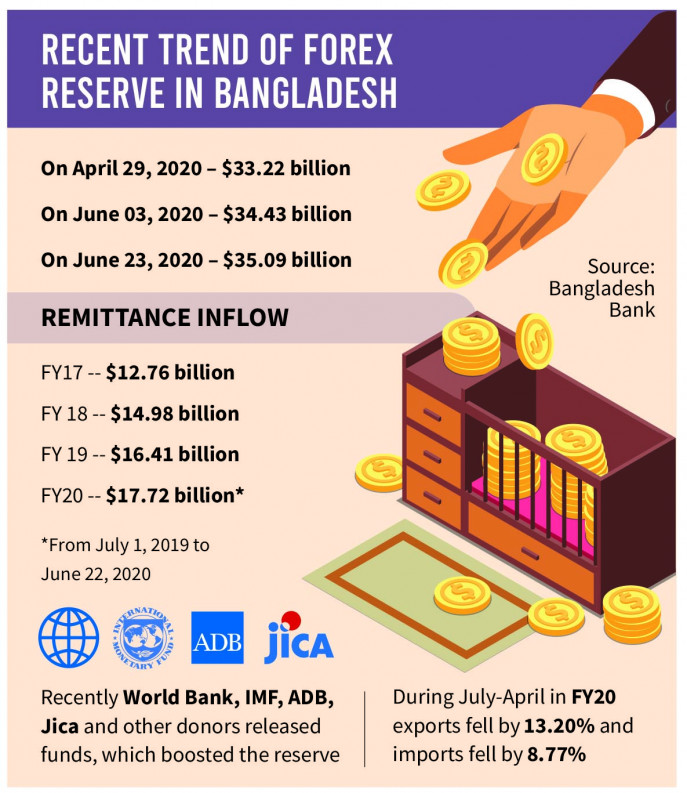The Business Standard 25 June 2020

The country’s foreign exchange reserves crossed the $35-billion mark for the first time.
“Though the foreign trade became slower, the foreign exchange reserves piled up because of a satisfactory remittance flow amid the coronavirus pandemic. The aid of developing partners also started to arrive, a senior official of the Bangladesh Bank told The Business Standard Wednesday morning.
According to the central bank, the country’s foreign exchange reserves rose to $35 billion on June 23. On June 3, the reserve crossed $34 billion mark for the first time.
Earlier, the previous highest reserves were recorded on September 5 in 2017- the amount was $33.68 billion.
An executive director of the Bangladesh Bank told The Business Standard on condition of anonymity, “Remittance is the key driver behind the rise of the reserve to this highest point. We recently received mission fund, some projects loan from the World Bank, Asian Development Bank, JAICA and others. We received the IMF fund 2-week back.”
From July 1, 2019, to June 22 this year, the amount of total remittance stood at $17.72 billion, which was 8 percent higher than the previous fiscal year.
In FY2018-19, the country received $16.49 billion remittances from our migrant workers.
According to the central bank data, from June 1 to June 22 remittance stood at $1.36 billion, on the other hand, the total inward remittance in June last year was $1.37 billion.
On June this year, the country’s remittance inflow crossed $17 billion mark in a fiscal year despite a recent fall for the Covid-19 pandemic.
The official said, “The main reason behind the increasing trend of remittance is the government decision to provide two percent incentive on inward remittance for the current fiscal year to discourage migrant people to send money through “Hundi” or illegal channels to send money from abroad.”
According to the budget proposal for the upcoming fiscal year 2020-21, the government is continuing two percent incentive on inward remittance.
Currently, there are over 1.02 crore Bangladeshis working in 174 countries across the world.
Ahsan H Mansur, executive director of the Policy Research Institute said, “I don’t see any hope with the increasing trend of reserve boosted by remittance. Because the remittance is not the recent income of our migrant worker, it is the savings. Now they started to send it home because they may have to back within a short time. In the Middle East countries, where oil price has fallen, migrant people have to lose their job.”
“A significant number of migrant workers will lose their job and return to the country because of the stress of Covid-19 pandemic in the near future,” he added.

